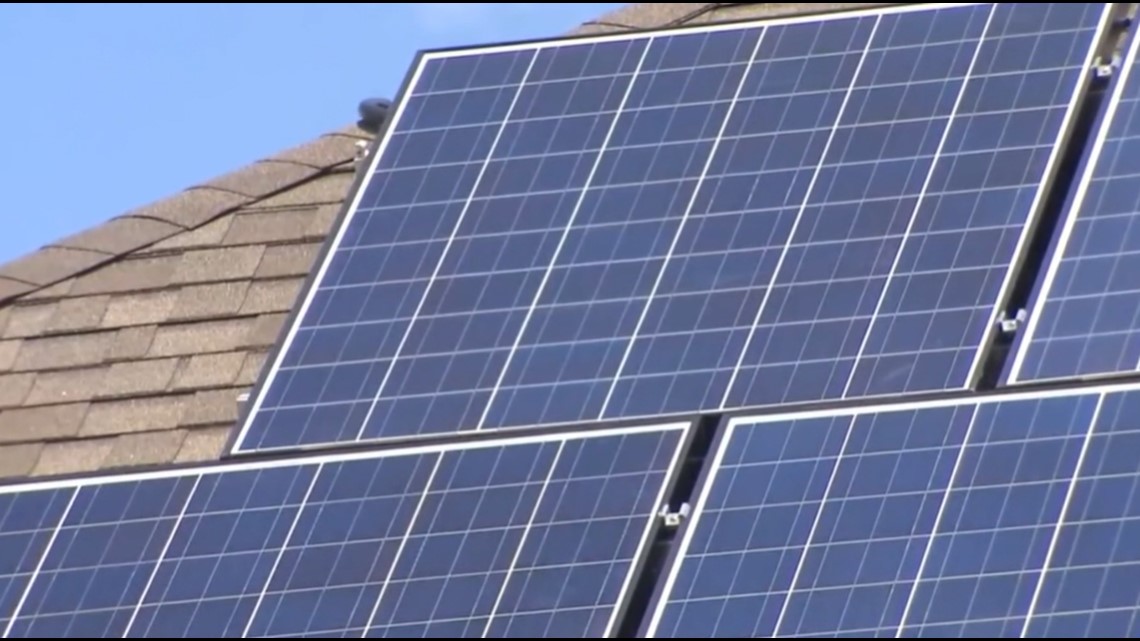Arizona rooftop solar study confirms regulations working ‘as intended’
October 18, 2024

The report comes as the rooftop solar industry and related customer-sided energy policies are targeted for elimination by a majority of Commissioners.
PHOENIX — Editor’s Note: The video above is from a previous story in August 2023.
Amid debate about whether Arizona regulators should continue tinkering with rooftop solar policies, an independent study released this week concludes a “Value of Solar” program is working as intended.
The report is a blow to efforts by second-year Arizona Corporation Commissioner Nick Myers, who wants to eliminate what he calls “subsidies” for rooftop solar owners. Last year the Commission ordered the study at the encouragement of Myers.
“The status quo is already unfairly stacked in favor of the utilities”
The report by Acadian Consulting Group amounts to a passing grade for the “Resource Comparison Proxy” that was first approved by Commissioners in 2017. The RCP is a methodology used to dictate how much for-profit utilities like APS pay to rooftop solar homeowners for the excess electricity they produce. The amount can be incrementally reduced each year, but not by more than 10%. The program is meant to provide stability for rooftop solar owners who invest their own money to install solar panels.
An attorney representing solar companies at the Commission downplayed the significance of the report.
“There was really never a reason to revisit it in the first place,” said Court Rich, attorney for solar companies in Arizona. “The status quo is already unfairly stacked in favor of the utilities.”
Report finds about $7.6 annually in “subsidization”
Myers did not respond to 12News for comment. It is unknown if he will continue to pursue eliminating the “Value of Solar” program as the Commission faces a makeover next year and potentially greater support for Myers’ cause. Voters will elect three new Commissioners. At least one candidate, Republican Rachel Walden, has also called for eliminating the RCP.
“Staff finds that the existing RCP is working as intended albeit with some degree of subsidization,” the report states. That “subsidization” amounts to about $7.6 million annually in excess payments to rooftop solar owners, compared to the “market-based value of solar generation,” the report states.
That conclusion uses a different methodology than that used by rooftop solar advocate Bob Burns. Burns, a former Commission Chair, said data showed in 2022 that APS paid less for RCP rates than for the overall “average market power.” Burns said the overall average includes what APS spent on electricity during peak hours. In the view of Burns, that would be a more realistic comparison. The Acadian Consulting Group report compares the RCP rate to the “wholesale price or LCOE of solar at the Palo Verde hub.” That refers to the market hub where major electrical trading happens in the western U.S.
12News asked Corporation Commission spokesperson Nicole Garcia to provide an explanation for the methodology, given conclusions by Burns. Garcia did not respond.
Solar & sustainability policies are being targeted by the commission
Past Commissions have made rooftop solar a priority, in part based on its decreasing costs and benefits to the environment. Unlike coal and natural gas, solar energy production emits zero emissions and requires no water. Rooftop solar also alleviates demand on the overall grid.
But the current 4-1 Republican majority is chipping away at renewable energy and efficiency policies. They approved a controversial “grid access charge” to rooftop solar customers in the APS rate case earlier this year, without articulating what the fee is meant to pay for. Critics allege it’s a discriminatory fee. That decision is in the middle of an appeals process.
The Commission also scrapped last year its energy efficiency and renewable standards, during a time most states are expanding them.
Renewable energy advocates accuse Commissioners of conceding to the wishes of the powerful fossil fuel lobby. Maintaining and building new coal and natural gas sources is generally a more profitable business model for utilities. Last year an expert witness for APS acknowledged what many already speculated: large utilities oppose customer-sided energy policies because those policies cut into shareholder profits. Commissioners have defended votes that consumer groups and environmental organizations have opposed, saying they are ensuring “regulatory stability” and reliability in a growing energy market.
A spokesperson for the state agency that represents consumers, RUCO, told 12News they were reviewing this latest study but they did not provide a comment at the time of this story.
APS supports current value of solar rates
Unsurprisingly, the report also stated that all stakeholders involved in the case, including APS, want to keep the rooftop solar RCP program in place. APS told the Commission last year they had no desire to revisit the issue.
The report also notes a growth in rooftop solar.
“Arizona has seen healthy distributed generation installations over the five years period 2018-2022, even with the implementation of the RCP,” the report states. Annual solar installations grew steadily from 22,500 in 2018 to more than 41,000 in 2022.
Study does not analyze other benefits
Rich said the study is not meant to measure the benefits solar rooftop customers provide to the energy grid through investing their own money, and therefore it does not provide a full picture of the purpose of the RCP.
“A careful and honest evaluation would find that several hundred thousand customers with solar have provided a great benefit to those without. The utilities would have to go and build infrastructure at great expense,” said Rich.
An expert witness for APS said during sworn testimony last year that large utilities oppose customer-sided energy policies because they cut into shareholder profits
Former Commission Chair Bob Burns, a supporter of regulations intended to encourage rooftop solar, says Arizona solar panels collectively make up the equivalent of the fourth largest “utility” in the state.
“If the rooftop solar community was not there, the private investment that they have made would have to be made by one of the monopoly utilities with the cost going into rate base to be paid by all ratepayers,” Burns said.
According to the National Renewable Energy Laboratory, solar energy costs range from 3-6 cents per kilowatt-hour, compared to 5-17 cents per Kilowatt-hour for fossil fuel energy. Fossil fuel and nuclear remain more versatile, however, given they can be deployed on demand. But solar energy storage is making progress.
Myers voted for a southwest gas construction allowance
Myers, a known critic of rooftop solar regulations, says the rooftop solar industry should be able to “stand on its own two feet” without “subsidies.”
Critics point out that every energy industry receives financial benefits via government incentives, but Myers only criticizes renewables.
Last year Myers voted for a Southwest Gas allowance that requires existing natural gas customers to pay an added fee for new gas lines of future customers. At the time Myers said, “It’s tough rates do go up.” When pressed about why his vote does not contradict his strict stance against subsidies, Myers said the construction allowance is like what other states have and it is premised on the idea that new customers will ultimately pay off the expense of those assets.
>> Download the 12News app for the latest local breaking news straight to your phone.
Search
RECENT PRESS RELEASES
Related Post




